ChangeThis
The original idea behind ChangeThis came from Seth Godin, and was built in the summer of 2004 by Amit Gupta, Catherine Hickey, Noah Weiss, Phoebe Espiritu, and Michelle Sriwongtong. In the summer of 2005, ChangeThis was turned over to 800-CEO-READ. In addition to selling and writing about books, they kept ChangeThis up and running as a standalone website for 14 years. In 2019, 800-CEO-READ became Porchlight, and we pulled ChangeThis together with the rest of our editorial content under the website you see now. We remain committed to the high-design quality and independent spirit of the original team that brought ChangeThis into the world.
-
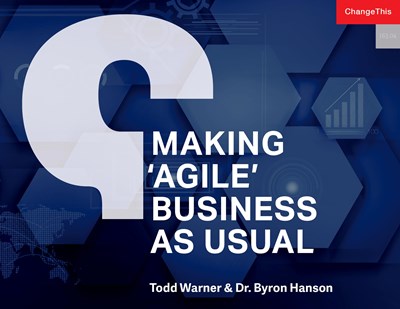
Blog / ChangeThis
Making 'Agile' Business as Usual
By Todd Warner, Dr. Byron Hanson
"There is more to Agility than putting lipstick on a pig. Organizations that attempt to migrate to Agile approaches need to take accountability for their 'inner pig.' Any sector can espouse Agile practices, such as SCRUMS, Sprints, and Stand-ups. That is the easy part. The challenge that most organizations face is that they layer Agile approaches on top of their existing social system, without addressing the intricate web of local practices and tribalism that have developed over time."
Categories: changethis
-
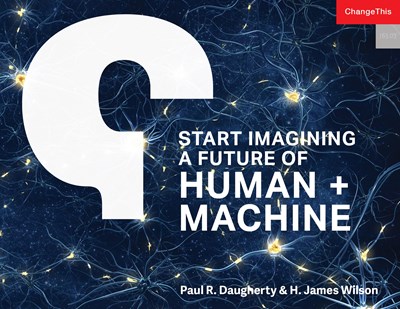
Blog / ChangeThis
Start Imagining a Future of Human + Machine
By Paul R. Daugherty, H. James Wilson
"In the first wave of transformation, businesses standardized processes. Think Henry Ford and the assembly line, where steps in the overall process were broken down, measured, and optimized to achieve gains in efficiency. The second wave of transformation brought automated processes. Think business process reengineering powered by advances in information technology like desktop computers, large databases, and software that automated various tasks. Now, the third wave is bringing adaptive processes. Think of mobile map apps that continuously use real-time data to create living, dynamic, optimized maps that get hundreds of thousands of individual users to their destinations as quickly as possible. And then imagine that principle of adaptability extended to business processes across all industries, organizations, and functions—that's the third wave that is transforming business as we know it."
Categories: changethis
-
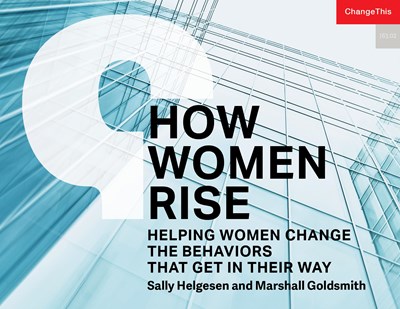
Blog / ChangeThis
How Women Rise: Helping Women Change the Behaviors that Get in Their Way
By Sally Helgesen, Marshall Goldsmith
"It's not surprising that many of the behaviors that hold men and women back would be different. After all, women often have very different experiences at work. And experience shapes habits and responses. Familiar habits and responses may feel intrinsic, like part of who you are. But they are not you; they are you on autopilot. Bringing them to conscious awareness is the first step on the path to effective behavioral change. Why focus on behaviors instead on of the cultural and structural factors that hold women back? Isn't that just a way of blaming women? Not at all. We are acutely aware that cultural and structural restraints still keep many women stuck, despite decades of admittedly uneven progress. But our focus in this book is on what lies within women's control, what women themselves can change."
Categories: changethis
-
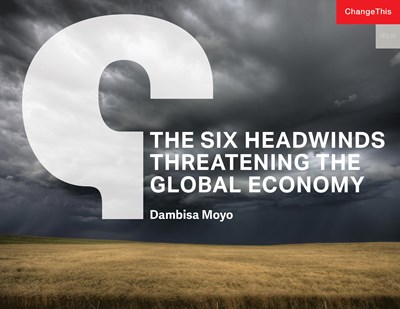
Blog / ChangeThis
The Six Headwinds Threatening the Global Economy
By Dambisa Moyo
"Yes, years of stimulus and ultra-low interest rates have finally brought the global economy to a point of rising employment and stronger economic growth. IMF and World Bank forecasts for global growth increased in January prompting a fresh wave of optimism. This revival in growth prospects is increasingly synchronized across advanced economies—notably in the US, EU, and Japan, and the leading developing countries, such as China, India, and Brazil. At a more granular level, many economies are seeing increases in capital investment and private consumption, as well as notable declines in unemployment. Yet, 10 years after the crisis, the global economy faces six structural headwinds that, left unchecked, promise to derail economic progress and damage living standards in the years ahead."
Categories: changethis
-

Blog / ChangeThis
For Outstanding Performance, Change How You Solve Problems
By Karen Martin
"Ask any business leader if he or she is good at solving problems and the likely response is, 'Of course!' After all, business leaders spend a lot of their time navigating problems. If they weren't good at it, those leaders would lose their jobs, wouldn't they? Not if the organization doesn't know what robust problem solving looks like. Most organizations don't and as a result they perform below their potential."
Categories: changethis
-
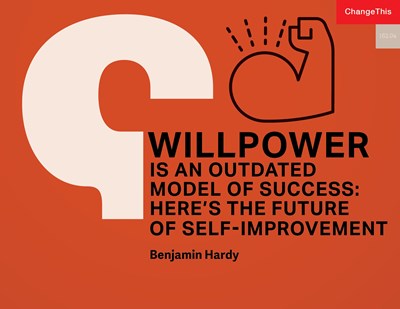
Blog / ChangeThis
Willpower Is an Outdated Model of Success: Here's the Future of Self-improvement
By Benjamin Hardy
"It's no wonder willpower has been placed under the media spotlight as essential to success. In a negative environment, willpower's all we have left. It's the life-raft, the backup parachute. And we're depending on it to save our skins. It takes a lot of willpower to remain positive in a negative environment. It's difficult to constantly say no when those around you are eating junk food. Or even worse, when you're required to exert willpower in your own home because you bought junk food you knew deep down you didn't want to eat. This is a huge waste of mental and emotional resources. Instead of being told to change their environment, the prominent self-help advice continues to charge people to change themselves. I can't emphasize enough how terrible this advice is. It's actually impossible to change yourself without also changing your environment. Your environment and you are two indivisible parts of the same whole."
Categories: changethis
-
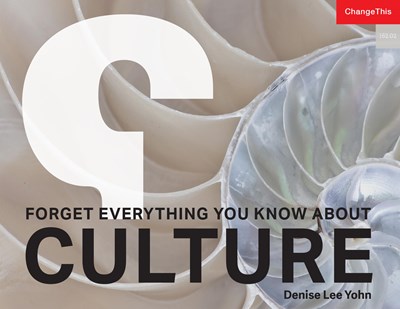
Blog / ChangeThis
Forget Everything You Know About Culture
By Denise Lee Yohn
"Most of the existing rhetoric on culture says that managers must be warm and nurturing and they must treat their employees like family, being encouraging and inclusive. That's just wrong. You don't need to offer a supportive, benevolent culture to be a great manager, organization, or business. And anyone who insists that you must have a certain type of culture gravely misunderstands the role culture plays in an organization. Culture is what enables your company to execute on its strategy and achieve its goals. It's part of what differentiates your organization. It helps you attract, develop, motivate, and retain the right employees. Just as there isn't a single brand identity that fits all companies, no one type of culture is right for all organizations. And just as it would be ridiculous to try to imitate another company's brand, it doesn't make sense for you to try to copy another organization's culture."
Categories: changethis
-
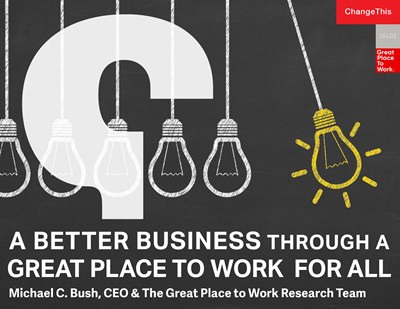
Blog / ChangeThis
A Better Business through a Great Place to Work for All
By Michael C. Bush CEO, The Great Place to Work Research Team
"What it means to be a great workplace has evolved. We have entered a new era, a new frontier in business. Our economy has evolved through agrarian, industrial, and 'knowledge' phases to the point where the essential qualities of human beings—things like passion, creativity, and a willingness to work together—are the most critical. In this 'human economy,' every employee matters. "
Categories: changethis
-
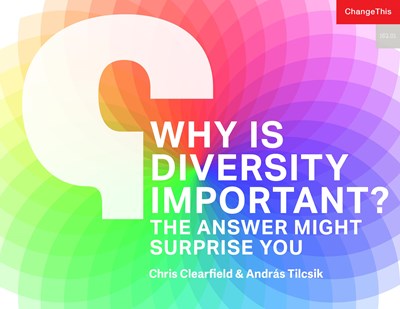
Blog / ChangeThis
Why Is Diversity Important? The Answer Might Surprise You
By Chris Clearfield, András Tilcsik
"Pundits and business gurus often talk about how diversity can spark creativity and innovation. Diversity, they tell us, is supposed to be something beautiful: Different people come together to learn from one another and create an inclusive team that's more than the sum of its parts. Everyone brings something special to the table, and the collaboration of unique individuals leads to amazing new ideas. But it turns out that diversity is often more painful than beautiful—and that's exactly why it's so valuable in complex environments. It helps because it makes things harder."
Categories: changethis
-
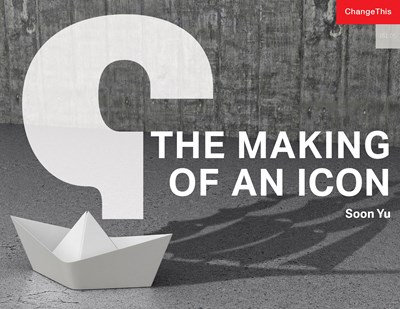
Blog / ChangeThis
The Making of an Icon
By Soon Yu
"Are you ready to strangle the next person who tells you to 'innovate or die', 'jump on the next S curve,' or 'find the game changer?' Do you wish there was an easier more profitable way to drive organic growth? Fortunately, this manifesto will help you stop chasing the new and instead, innovate the old. [...] Iconic Advantage is a different approach that allows companies to leverage what they already have to create lasting differentiation and deeper relationships with their customers. It generates disproportionate levels of profit and protects you against market fluctuations. Many of the world's most successful brands have been using it for years. Now, you can benefit from reaching iconic status, whether you're a Fortune 500, local pizza parlor, or an aspiring Unicorn startup."
Categories: changethis

